DAMASCENE GOLD WORK or DAMASQUINADO – A process of arms
and jewelry decoration most commonly associated with Spain. To create
damascene ornamentation the engraver or damasquinador engraves or
punches tiny raised teeth on the surface of the metal in the shape of
the desired design. 24-karat gold or fine silver is then punched down
onto the teeth. The design is then trimmed or cleaned up with a burin.
Spanish damascene work commonly uses designs of Moorish or Arabic
design as contrasted with other forms of gold or silver overlay using
European motifs. French: La damasquinure.

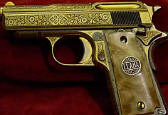
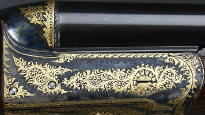
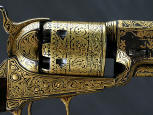
Pictured are a Spanish pocket knife and Llama pistol, an English
shotgun and a Colt revolver all adorned with damascene gold work.
|
DAMASCUS STEEL - Damascus steel is a hot-forged steel used in
Middle Eastern swordmaking from about 1100 to 1700 AD. Damascus swords
were of legendary sharpness and strength. The general term "Damascus"
refers to metal with a visible grain pattern, sometimes with a texture.
Modern Damascus is a lamination of folded steels selected with cosmetic
qualities, with grinding and polishing specifically to expose the
layers. True Damascus patterns are formed when carbon trace elements
form visible swirls in the steel mix. These elements change properties
when the steel is work hardened (forged), creating the patterns.
Today, custom knifemakers and bladesmiths pride themselves on the
beauty and cutting ability of their Damascus blades. Many of the custom
Damascus bladed knives find themselves the subject of the engraver’s
art since the combination of engraved bolsters or scales and a Damascus
blade are considered by many knife collectors to be the pinicle of the
“art knife” craft.
In the realm of firearms, Damascus steel steel barrels were the
province of shotguns and rifles prior to the 20th century. A discussion
of Damascus gun barrels could fill an encyclopedia but their relation
to engraving is that they are found on many engraved guns of their
period.
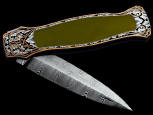
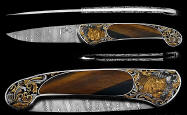

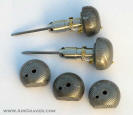
Pictured are a Busfield knife and a Hoel knife with Damascus steel
blades and engraving by Steve Lindsay. Also shown is a Parker shotgun
with Damascus steel barrels and
Lindsay PalmControls™ with Damascus handles.
|
DIE - A die is a specialized tool used in manufacturing
industries to cut, shape and form a wide variety of products and
components. Like molds and templates, dies are generally custom
engraved and uniquely matched to the product they are used to create.
Products made with dies range from coins and medals to complex pieces
used in advanced technology.
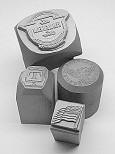
Pictured is an assortment of dies and hubs.
|
DIE EMBOSSING or IMPRESSING – A process of creating a
raised or impressed design or lettering in a metal surface by striking
or rolling with a die. Mass produced guns often are found with die
impressed decoration that is sometimes incorrectly referred to as
“engraving.”
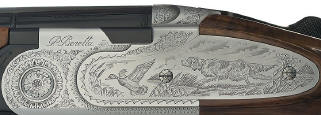
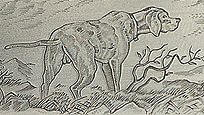
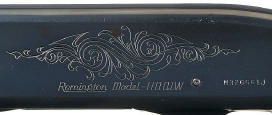
Pictured are three examples of die impressed decoration on guns.
|
DIE ENGRAVING – A process of engraving, either by hand, machine,
or a combination of both, to create a die or hob. Dies are used to
strike coins, medals, medallions and a variety of other manufactured
objects. Hobs or hubs are the male counterpart of a die and are used to
strike a die and are often used as a master.
|
DIE SINKER’S CHISEL – An engraving chisel used by steel die
engravers. Much longer than the usual arms or jewelry engraver’s
chisel, it usually measures about 6 to 7 ½ inches. Some arms engravers
in past times preferred to use diesinker’s chisels for large
scrollwork. Diesinker’s chisels are sold in size and shape from # 1 to
# 12. Italian: Cesello

|
DISTELORNAMENT – German for thistle ornamentation. Engraved
thistles are common on Austrian sporting guns and occasionally found on
Scottish arms.
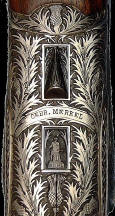
|
DONUT SCROLL – Collectors of Colt percussion revolvers have
coined this term to describe a particular style of scroll engraving
found on factory engraved revolvers of the 1851–1852 period. The “donut
scroll” (not doughnut) style features spirals with thick inner and
outer leaves. Donut scroll is only to be found on a rare few second
model Colt dragoons, with the majority being third model dragoons, 1849
pocket models, and 1851 Navy’s.

Pictured is an example of "donut scroll" on an antique Colt revolver.
|
DOWN-CUT – Any cut engraved downward in the direction of the
base or horizontal line in lettering.
|
DRAGON HEAD HAMMER – The hammer of a firearm (usually a
revolver) engraved to look from the side like the head of a dragon.
Variations include an eagle or wolf head. At one time percussion
revolvers engraved with the wolf motif on the hammer were thought to be
the work of jewelry engraver, Joseph Wolf, but were later found to be
the work of Louis D. Nimschke of New York, who was active from 1850 to
1900.
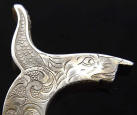
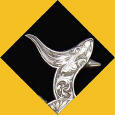
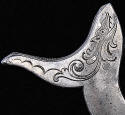
|
DRAW PLATE - A draw plate, or "drawing die", is a type of die
consisting of a metal plate with one or more holes through which wire
is drawn to make it thinner. Plates are available in many different
sizes and shapes for drawing different shapes of wire, including round,
square, oval, half-round and hexagonal. The plate has rows of holes
drilled through it which are slightly wider at the back. Engravers use
a draw plate to draw precious metal wire to the size needed for inlay,
overlay and damascene gold work. While drawing, the wire must be
annealed with heat after each pass through each successive hole.
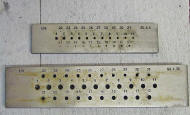
|
DUMMY SIDE PLATE – Blank side plates fitted to a box lock
shotgun or double rifle to give the appearance of the more desirable
side lock action or to provide more space for engraving.
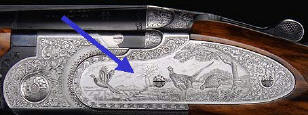
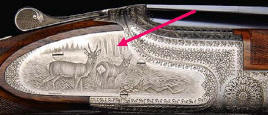
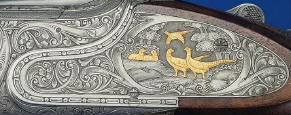
Pictured are three O/U shotguns with dummy sideplates, a Beretta 687
EELL whose sideplates are hand engraved with die impressed scrollwork
elsewhere, a high grade Belgian Browning Superposed (all hand
engraved), and a very high grade Superposed engraved and gold inlayed
by J. M. Debrus (signature below rocks in vignette). Note: Arrows point
to dummy sideplates.
|